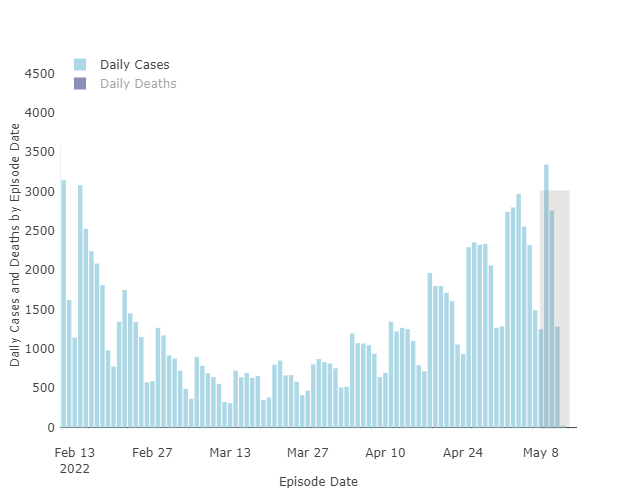Another 4,025 COVID-19 infections were reported in Los Angeles County Friday, the highest single-day number since mid-February, with health officials saying it shows further evidence of continued high transmission of the virus.
The number of COVID-positive patients in the county also ticked upward, reaching 298, up from 267 a day earlier. The number of those patients being treated in intensive care was 33, up from 25 on Thursday.
“If you’re not fully vaccinated and boosted, please consider doing so now to maximize protection against the more infectious variants currently circulating,” county Public Health Director Barbara Ferrer said in a statement. “There are hundreds of mobile and fixed sites that offer free vaccines across the county, via appointment or walk in. We’re also providing vaccines and boosters at community events and pop-up vaccination clinics at community sites, partnering with schools and community-based organizations to offer vaccinations at priority school and work sites, and offering vaccines in your home for those who cannot get to a medical office or pharmacy.”
The new cases reported Friday lifted the county’s cumulative total from throughout the pandemic to 2,907,721.
Six more virus-related fatalities were reported Friday, raising the county’s COVID death toll to 32,022.
The average daily rate of people testing positive for the virus was 2.8% as of Friday, up from 2.6% Thursday.
Ferrer said Thursday the average daily number of new cases recorded over the past week rose to more than 2,600, up nearly 20% from a week ago. The county’s transmission rate also continues to rise, with the average daily rate at 26 per 100,000 residents, up from 21 a week ago. More notably, the seven-day cumulative rate reached 176 per 100,000 residents. If that number tops 200 per 100,000 residents, it will move Los Angeles County from the low-transmission rate as defined by the U.S. Centers for Disease Control and Prevention, to a moderate level.
Continued increases could potentially lead to a re-imposition of public health rules, such as indoor mask wearing.
The rising case rates, however, have not led to the normally anticipated surge in virus-related hospitalizations or deaths.
Ferrer said the county is averaging about four virus-related deaths per day. The number of COVID-positive patients in county hospitals has also remained relatively steady.
Ferrer said a variety of factors was likely preventing hospitalization and death numbers from rising, including widespread vaccinations, natural immunity from previous infections and the availability of therapeutics aimed at knocking down infections before they develop into severe illness.
But she said another factor was the relatively low infection rates among the age groups most vulnerable to developing severe illness from COVID. Residents age 80 and older currently have the lowest rate of COVID infection in the county, followed by children below age 5, followed by adults age 65-79 and adults aged 50-64.
The highest infection rate is currently among the 12-17 age group, followed by those 18-29 and then 30-49.
Ferrer again noted the increased danger facing unvaccinated residents, saying they are five times more likely to be hospitalized due to COVID, and 16 times more likely to die, than their vaccinated counterparts.
She also pointed to a recent study that determined vaccinations prevented more than 1.5 million infections in California during the first 10 months they were available, along with 72,000 hospitalizations and 19,000 deaths.







